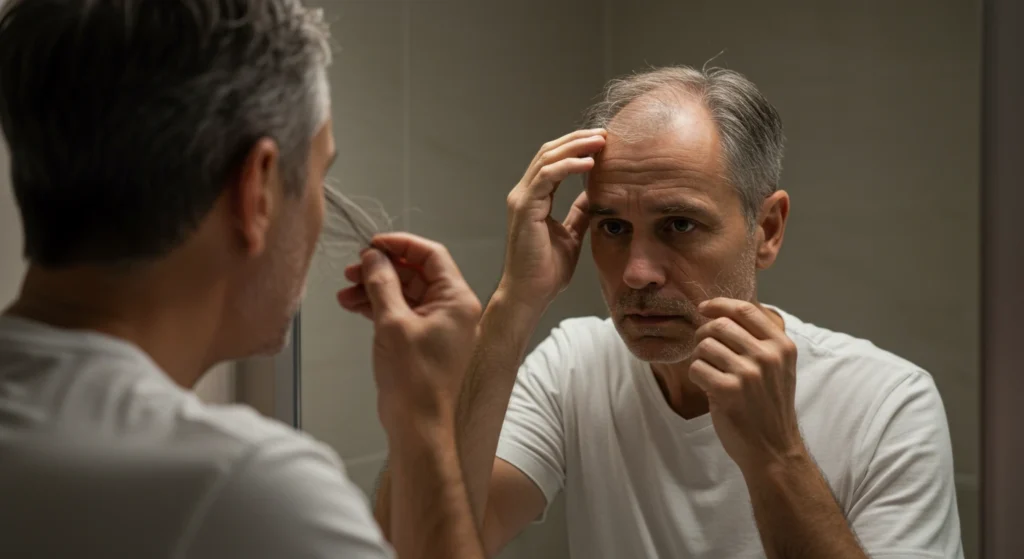Struggling with hair thinning and curious about natural alternatives? Chinese medicine for hair loss offers a time-tested approach rooted in restoring balance and nourishing the body from within.
This article explores how traditional Chinese herbs and therapies like acupuncture address the root causes of hair loss. You’ll discover safe, holistic remedies, expert advice, and how to combine TCM with modern treatments. Let’s dive into how you can take a balanced, effective path toward healthier hair.
Understanding Hair Loss from a Chinese Medicine Perspective

How Traditional Chinese Medicine (TCM) Views Hair Health
In Traditional Chinese Medicine, hair health is closely linked to the Kidneys, Liver, and Blood. Rather than focusing on external symptoms, TCM addresses internal imbalances believed to cause hair thinning.
- Kidneys are considered the source of vitality and hair growth.
- The liver governs blood flow, which nourishes the scalp and follicles.
- Blood deficiency can lead to brittle, thinning hair.
- Qi (energy) stagnation may disrupt circulation to the scalp.
Common Root Causes of Hair Loss in TCM
- Kidney Yin Deficiency – Leads to dry, brittle hair and premature greying.
- Blood Deficiency – Results in poor follicle nourishment.
- Liver Qi Stagnation – Often stress-related, contributes to patchy hair loss.
- Damp Heat in the Scalp – Associated with inflammation and oily hair loss.
Differences Between Western and Chinese Medical Approaches
While Western medicine often treats hair loss with topical treatments like minoxidil or surgical procedures, TCM focuses on internal balance and holistic healing. Instead of suppressing symptoms, it aims to restore harmony between organs, Qi, and blood.
Popular Chinese Herbal Remedies for Hair Loss
He Shou Wu (Fo-Ti)
Perhaps the most famous TCM herb for hair health, He Shou Wu is believed to nourish the liver and kidneys, promoting hair regrowth and preventing greying. Preliminary studies suggest it may increase the number of hair follicles in the growth phase.
Ginseng
Ginseng improves blood circulation and Qi flow. It helps stimulate the scalp, strengthens follicles, and reduces hair fall, especially in stress-induced alopecia.
Dang Gui (Angelica Sinensis)
Often used to build blood, Dang Gui is ideal for treating hair loss linked to blood deficiency. It’s rich in phytoestrogens and may be beneficial for hormonal hair loss.
Ligustrum and Rehmannia
These tonic herbs support kidney and liver function, promoting healthier, thicker hair. They’re often included in multi-herb formulas for alopecia.
Recommended Combinations and Formulas
- Shou Wu Pian – A classic formula featuring He Shou Wu and supporting herbs.
- Qi Bao Mei Ran Dan – Enhances hair color and texture.
- Always consult a TCM practitioner for personalized formulations.
Scientific Studies and Evidence
While more clinical trials are needed, animal studies and early research show that He Shou Wu and ginseng may influence hair regrowth. However, quality and preparation significantly affect results
Acupuncture and Scalp Therapy in Chinese Medicine
How Acupuncture Improves Blood Flow and Stimulates Hair Follicles
Acupuncture enhances circulation to the scalp and stimulates dormant hair follicles. It also reduces stress, which is often a major contributor to hair loss.
Case Studies on Acupuncture for Alopecia and Thinning Hair
Clinical reports show improvement in alopecia areata and telogen effluvium after regular acupuncture sessions. Results vary based on frequency, needle placement, and individual constitution.
Scalp Massage and Meridian Therapy
TCM scalp massage, using specific meridian points, improves Qi flow and detoxifies the scalp. It’s often combined with herbal oils or tonics for enhanced absorption.
Diet and Lifestyle According to TCM Principles
Foods that Nourish Hair and Blood in TCM
- Black sesame seeds
- Walnuts
- Goji berries
- Bone broth
- Dark leafy greens
These foods support blood and kidney essence, crucial for healthy hair.
Foods to Avoid that Aggravate Hair Loss
- Spicy, greasy, and deep-fried foods (increase internal heat)
- Cold/raw foods (weaken digestion and Qi production)
- Excess caffeine and alcohol
Daily Practices to Balance Qi and Promote Hair Growth
- Tai Chi or Qi Gong to move stagnant energy
- Stress reduction techniques like meditation
- Adequate sleep to restore kidney energy
Integrating Chinese Medicine with Modern Treatments
Can You Combine TCM with Minoxidil, PRP, or Hair Transplants?
Yes. TCM can complement modern treatments:
- Use TCM herbs to strengthen internal health pre- and post-transplant.
- Acupuncture can reduce inflammation and promote healing after PRP or FUE.
- Avoid herbal interactions with prescription meds—consult your doctor first.

Potential Side Effects and Considerations
Quality Control Issues in Herbal Supplements
Some imported herbs may contain heavy metals or contaminants. Always choose GMP-certified or locally regulated brands.
Who Should Avoid Certain Chinese Herbs?
- Pregnant or breastfeeding women
- Patients with liver/kidney disorders
- Those on blood thinners or diabetes medications
How to Choose a Certified TCM Practitioner
- Look for practitioners registered with a national board.
- Check credentials and reviews.
- Ask about their experience with hair loss.
Frequently Asked Questions (FAQs)
Can Chinese medicine regrow lost hair?
How long does it take for Chinese herbs to work?
Is acupuncture painful for hair loss treatment?
Are there side effects to He Shou Wu?
Can I use Chinese medicine alongside minoxidil?
Book a Consultation with a Hair Restoration Expert
If you’re looking for a holistic, effective solution to hair loss, Chinese medicine offers a powerful alternative. Book a consultation with Dr. Rana Irfan, an ABHRS and ISHRS certified specialist trained in both modern hair restoration and integrative approaches. Get a customized plan that aligns ancient wisdom with today’s best practices.
